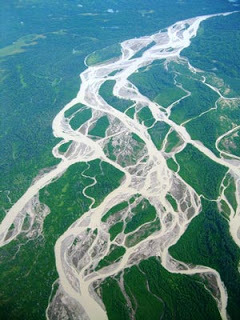Estuary Dredge?
I encountered a word late last week I didn't know: estuary. It's got me thinking about the title of the sister's section. Initially I started calling it Tributary, as a kind of default title; almost a joke between Pat and me. It seemed appropriate – a joining of the other two sections – and reader Ben Bormann's point was so compellingly insightful I kept it.
But now there's some real competition. Let's looks at the definitions, courtesy of dictionary.com (which is careful enough for our purposes):
 Tributaries.Tributary
Tributaries.Tributary
–noun
1. a stream that flows to a larger stream or other body of water.
2. a person or nation that pays tribute in acknowledgment of subjugation or the like.
–adjective
3. (of a stream) flowing into a larger stream or other body of water.
4. furnishing subsidiary aid; contributory.
5. paying or required to pay tribute.
6. paid as tribute.
7. subject; subordinate: a tributary nation.
Estuary
–noun
1. that part of the mouth or lower course of a river in which the river's current meets the sea's tide.
2. an arm or inlet of the sea at the lower end of a river.
"Tributary" has the advantages of connecting any type of waterbody, such as a well and a pond (stretch with me). But it also carries the connotation of "subordinate" and "required to pay tribute," which are diametrically not the connotations I want plaguing the sister's section, considering she has only 1/3 of the first section – to two male voices. Tributaries, as Ben points out, change their "larger streams" subtly. I'm coming to think of them as a kind of riverine tai chi. And that's important here, too.
 An Estuary.The "estuary," conversely, occurs at the end of the river. It's the river's final statement, and composed voice to the ocean. It also serves as the "inlet of the sea," a quiet, human-sustaining space. Figuratively, the sister's section could be an inlet of Saltwater, a modern reflection of it. Following this line of thought, this may not be a question I can answer until I've written (and rewritten) Saltwater well enough to fully understand it.
An Estuary.The "estuary," conversely, occurs at the end of the river. It's the river's final statement, and composed voice to the ocean. It also serves as the "inlet of the sea," a quiet, human-sustaining space. Figuratively, the sister's section could be an inlet of Saltwater, a modern reflection of it. Following this line of thought, this may not be a question I can answer until I've written (and rewritten) Saltwater well enough to fully understand it.
Tributary/Estuary isn't fleshed out yet, and aside from its narrative backbone, I haven't found its essence. It'll be fascinating to see where either name encourages it.
What's your take?
But now there's some real competition. Let's looks at the definitions, courtesy of dictionary.com (which is careful enough for our purposes):
 Tributaries.Tributary
Tributaries.Tributary–noun
1. a stream that flows to a larger stream or other body of water.
2. a person or nation that pays tribute in acknowledgment of subjugation or the like.
–adjective
3. (of a stream) flowing into a larger stream or other body of water.
4. furnishing subsidiary aid; contributory.
5. paying or required to pay tribute.
6. paid as tribute.
7. subject; subordinate: a tributary nation.
Estuary
–noun
1. that part of the mouth or lower course of a river in which the river's current meets the sea's tide.
2. an arm or inlet of the sea at the lower end of a river.
"Tributary" has the advantages of connecting any type of waterbody, such as a well and a pond (stretch with me). But it also carries the connotation of "subordinate" and "required to pay tribute," which are diametrically not the connotations I want plaguing the sister's section, considering she has only 1/3 of the first section – to two male voices. Tributaries, as Ben points out, change their "larger streams" subtly. I'm coming to think of them as a kind of riverine tai chi. And that's important here, too.
 An Estuary.The "estuary," conversely, occurs at the end of the river. It's the river's final statement, and composed voice to the ocean. It also serves as the "inlet of the sea," a quiet, human-sustaining space. Figuratively, the sister's section could be an inlet of Saltwater, a modern reflection of it. Following this line of thought, this may not be a question I can answer until I've written (and rewritten) Saltwater well enough to fully understand it.
An Estuary.The "estuary," conversely, occurs at the end of the river. It's the river's final statement, and composed voice to the ocean. It also serves as the "inlet of the sea," a quiet, human-sustaining space. Figuratively, the sister's section could be an inlet of Saltwater, a modern reflection of it. Following this line of thought, this may not be a question I can answer until I've written (and rewritten) Saltwater well enough to fully understand it.Tributary/Estuary isn't fleshed out yet, and aside from its narrative backbone, I haven't found its essence. It'll be fascinating to see where either name encourages it.
What's your take?
Published on January 25, 2011 20:59
No comments have been added yet.
Adam Rubinstein's Blog
- Adam Rubinstein's profile
- 5 followers
Adam Rubinstein isn't a Goodreads Author
(yet),
but they
do have a blog,
so here are some recent posts imported from
their feed.



